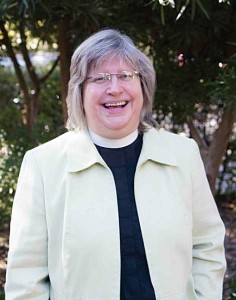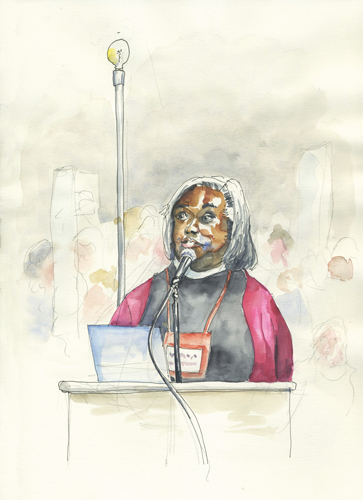
A Blessing Ceremony for Same-Gender Relationships

St. Stephen’s to be the first Episcopal Church in Houston to offer same-gender blessings
by Neil Ellis Orts
Illustrations by Carvel Glenn
St. Stephen’s Episcopal Church sits on the corner of Alabama and Woodhead in Houston’s Montrose neighborhood. It has a long history of being progressive—they were the first Episcopal congregation in Texas to have a female rector—and the diversity of their membership is easily noticed by the number of gay and lesbian couples in the pews.
In June, during the 2012 General Convention of the Episcopal Church (their national gathering at which all kinds of decisions are made about the life of the church), one item of business was a proposal to approve a rite for blessing same-gender relationships. This past spring, in anticipation of that proposal passing, Bishop Andy Doyle decided to get ahead of the changes by appointing St. Stephen’s as one of two sites in the Diocese of Texas authorized to use the rite (the second being St. David’s in Austin).
The proposal did, indeed, pass, and St. Stephen’s, under the leadership of their rector, the Reverend Lisa Hunt, has been having meetings and forums throughout the summer about the same-gender blessing rite. Although the actual implementation of the rite is still months away, I sat down with pastor Hunt to talk about what’s happening at St. Stephen’s, her personal history with the LGBT community, and this new rite in the Episcopal Church.
Neil Ellis Orts: I understand you had a religiously conservative childhood. How did you come to be an advocate for LGBT people?
Rev. Hunt: I was at Vanderbilt Divinity School, which was a very liberal sort of place. One of my seminal experiences was befriending Janet. She was preparing for ministry in the Metropolitan Community Church. I’d never known anybody from the MCC before, so that was an interesting experience. I think what really happened was I fell in love with a gay man. That kind of changes your world when you start coming to realize those things. Coming into that world and seeing the limitations that were confronting the people that I cared about, and their family lives—that was very formative to me. Then I was a chaplain at the University of the South right after I was ordained. As a chaplain, I started a gay-straight alliance out of the chapel, which was a very radical move. This would have been 1988, and AIDS was just starting to pick up, but it hadn’t touched [our Tennessee mountaintop] yet. It turns out there are a ton of gay alumni from Sewanee. One of them knew of my ministry in starting the gay-straight alliance, and gave a big gift to the university contingent upon the continuance of that ministry. Then I got called from there to St. Anne’s [in Nashville] which was in a neighborhood that was very much like Montrose, so reaching out to the LGBT community was a natural. So that began many years of ministry in this area.

And now you’ll be doing same-gender blessings. For those not familiar with Episcopal Church polity, can you explain briefly why the General Convention had to approve this rite?
We [Episcopalians] can’t do any worship services that aren’t approved by the whole church. We can’t offer any religious services whose form isn’t approved. So what the General Convention did was to say this is the way that these rites are going to be done, this is who’s going to do them, and these are the requirements.
What has been the reaction to it, broadly?
I don’t think this was unexpected. I think the preparation had been done three years ago. Many people are relieved that there’s now an official form and it’s not a do-your-own-thing sort of thing. Episcopalians don’t do that well. In terms of push-back from the broader Anglican Communion, I would say that the people who had been unhappy with the Episcopal Church continue to be so, but I don’t think it’s brought any more negativity than our previous stands have.
So people who were angry in 2009 have left the church?
I would say the fire was hot back then, and the reactions and the separations that were going to take place have pretty much taken place.
Locally, you are the only place in Houston authorized to offer the same-gender blessings. Do you have a sense about why you, along with St. David’s in Austin, are the only places in the diocese to offer them?
I think we won’t be the only congregation in Houston to offer it. I think Bishop Doyle was interested in being able to pilot this in

some way. To get preparation done, to get teaching done, get best practices in order, to be able to experiment before rolling it out diocese-wide. St. David’s is a larger congregation than St. Stephen’s, and it’s also more theologically diverse. So I think the bishop wanted to know how that would play in two different kinds of congregations.
Do you have a sense for how long it will be before other congregations will be allowed to do the rite?
I don’t think it’s going to be that long. My hope would be that within a year, someplace else will be authorized to do it.
Do you feel that this in any way changes the focus of the ministry at St. Stephen’s?
I think it broadens us out. I think one of the things we’re finding is that as we talk about these things publicly, not only are LGBT people finding us, but straight people are finding us—[people] who are looking for a congregation that would be inclusive. So rather than being off-putting, the offering of the rite is invitational to other people.
I’ve heard there’s been a large number of visitors lately. Do you think that’s connected to this?
Exactly. I think word of St. Stephen’s has been attractive. Then there’s what’s going on in the broader culture, like the Democratic [convention, during which the Democrats added LGBT rights to their platform]. I think this is in keeping with what’s been happening on a broader scale, culturally speaking.
Neil Ellis is a frequent contributor to OutSmart magazine.










